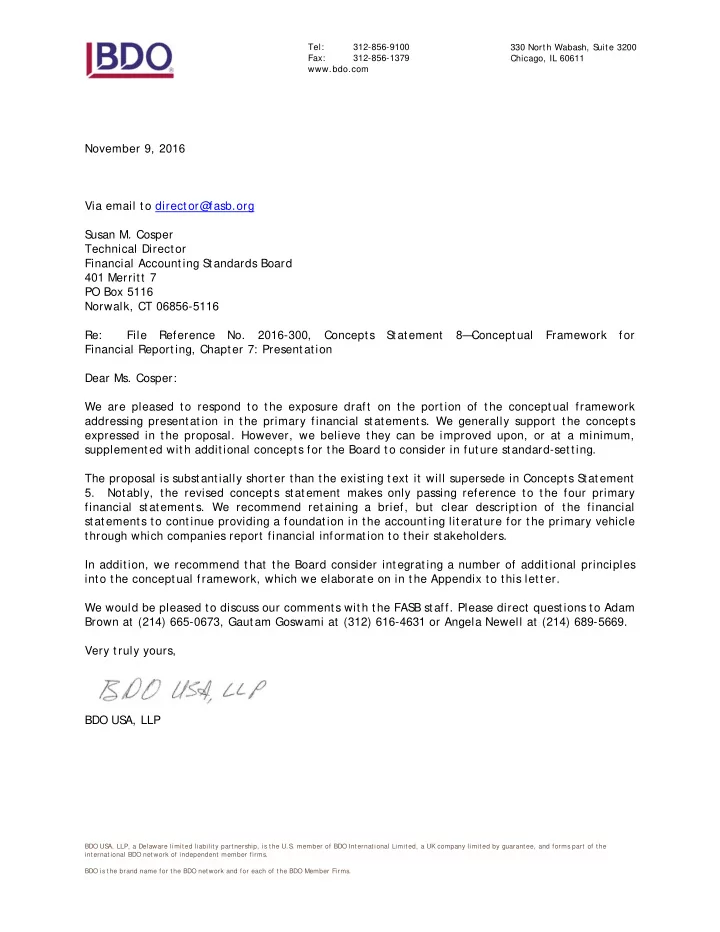

Tel: 312-856-9100 330 North Wabash, S uite 3200 Fax: 312-856-1379 Chicago, IL 60611 www.bdo.com November 9, 2016 Via email to director@ fasb.org S usan M. Cosper Technical Director Financial Accounting S tandards Board 401 Merritt 7 PO Box 5116 Norwalk, CT 06856-5116 Re: File Reference No. 2016-300, Concepts S tatement 8— Conceptual Framework for Financial Reporting, Chapter 7: Presentation Dear Ms. Cosper: We are pleased to respond to the exposure draft on the portion of the conceptual framework addressing presentation in the primary financial statements. We generally support the concepts expressed in the proposal. However, we believe they can be improved upon, or at a minimum, supplemented with additional concepts for the Board to consider in future standard-setting. The proposal is substantially shorter than the existing text it will supersede in Concepts S tatement 5. Notably, the revised concepts statement makes only passing reference to the four primary financial statements. We recommend retaining a brief, but clear description of the financial statements to continue providing a foundation in the accounting literature for the primary vehicle through which companies report financial information to their stakeholders. In addition, we recommend that the Board consider integrating a number of additional principles into the conceptual framework, which we elaborate on in the Appendix to this letter. We would be pleased to discuss our comments with the FAS B staff. Please direct questions to Adam Brown at (214) 665-0673, Gautam Goswami at (312) 616-4631 or Angela Newell at (214) 689-5669. Very truly yours, BDO US A, LLP BDO US A, LLP, a Delaware limited liability partnership, is the U.S . member of BDO International Limited, a UK company limited by guarantee, and forms part of the international BDO network of independent member firms. BDO is the brand name for the BDO network and for each of the BDO Member Firms.
Technical Director Financial Accounting S tandards Board Page 2 of 4 Question 1: Would the concepts for developing line items in this proposed chapter encompass the information appropriate for the Board to consider for developing financial statements that would assist resource providers in their decision making? Are there concepts that should be added or removed? We generally support the concepts expressed in the exposure draft. However, we believe they can be improved upon, or at a minimum, supplemented with additional concepts for the Board to consider in future standard-setting. The proposal is substantially shorter than the existing text it will supersede in Concepts S tatement 5. Notably, the revised concepts statement makes only passing reference to the four primary financial statements: balance sheet , income statement, cash flow statement and a statement of stockholders’ equity, including the brief allusion in paragraph PR19. We recommend retaining a brief, but clear description of the financial stat ements to continue providing a foundation in the accounting literature for the primary vehicle through which companies report financial information to their stakeholders. In addition, we recommend that the Board consider integrating the following principles into the conceptual framework. A number of them are relevant to presentation guidance, but also apply to recognition and measurement: Operabilit y — Financial information must be prepared (and audited) in a cost-effective manner. While we agree that the fundamental qualitat ive characteristics are relevance and faithful representation (PR38), financial information cannot be provided if the preparation costs are too high, part of which depends upon the degree of estimation that may be required to comply with a particular standard. For example, the Board established a constraint on the amount of estimated revenue that an entity should record under AS C 606 due to concerns about subsequent reversals of revenue. We agree that this was a prudent step, even if a more representational faithful estimate would have resulted without a constraint. Including the notion of operability into the framework should enhance the practicality of accounting standards, and therefore their durability. S implicit y — all else being equal, simplicity is better than complexity. This is evident in the Board’ s recent S implification Initiative, which we support. Rather than waiting to simplify standards after their implementation, a conceptual preference for simplicity would assist the Board in minimizing unintended consequences. For example, the Board’ s decision in FIN 46 and FIN 46(R) to identify the party with a controlling financial interest based on absorbing a maj ority of the expected losses was a principle that few constituents were able to apply easily. Eventually the consolidation guidance was amended to explicitly identify the party with “ power” over an investee, which is a concept that most practitioners find more intuitive. Consequently, we recommend embedding a preference for simplicity into the framework to foster constituents’ understanding of the Board’ s intent. Business model — We are aware that historically individual Board members have held diverse views on when, if ever, an entity’ s business model should inform accounting standards. With respect to financial statement presentation, current practice in certain sectors is partly driven by the reporting entity’ s business. To illustrate, some real estate companies do not find it useful to present a classified balance sheet due to the long-term nature of their assets and related capital, even though a manufacturing entity that owns a factory would typically present it as a long-term asset. S imilarly, some of a bank’ s purchases and sales of short-term near-cash instruments may be presented as an investing activity when similar transactions are presented as a cash equivalent by entities that are not financial institutions. Gross vs net cash flow presentations for these instruments are also
Recommend
More recommend